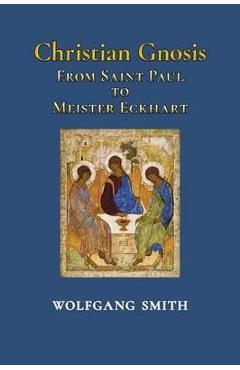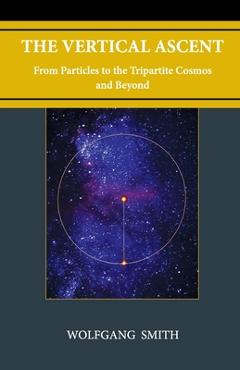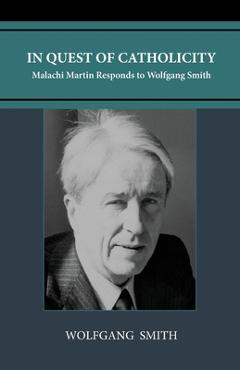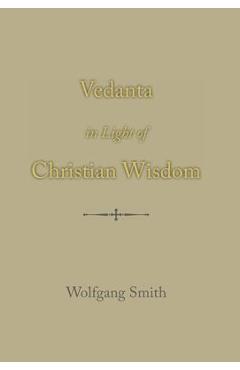Christian Gnosis: From Saint Paul to Meister Eckhart - Wolfgang Smith

Detalii Christian Gnosis: From Saint Paul
libris.ro
140.99 Lei
156.65 Lei
Religion
Wolfgang Smith
Christian Gnosis: From Saint Paul - Disponibil la libris.ro
Pe YEO găsești Christian Gnosis: From Saint Paul de la Wolfgang Smith, în categoria Religion.
Indiferent de nevoile tale, Christian Gnosis: From Saint Paul to Meister Eckhart - Wolfgang Smith din categoria Religion îți poate aduce un echilibru perfect între calitate și preț, cu avantaje practice și moderne.
Preț: 140.99 Lei
Caracteristicile produsului Christian Gnosis: From Saint Paul
Comandă Christian Gnosis: From Saint Paul Online, Simplu și Rapid
Prin intermediul platformei YEO, poți comanda Christian Gnosis: From Saint Paul de la libris.ro rapid și în siguranță. Bucură-te de o experiență de cumpărături online optimizată și descoperă cele mai bune oferte actualizate constant.
Descriere magazin:
Basing himself principally upon the teachings of Saint Paul and the Clementine Stromata, the author begins the present treatise by distinguishing the idea of gnosis in nascent Christianity from its Gnostic counterfeit. He then considers the implications of authentic gnosis for cosmology, a question that connects intimately with his earlier studies, notably his ground-breaking work regarding the interpretation of quantum theory. The same considerations, however, which invalidate naïve cosmology, have bearing on the theological notion of creatio ex nihilo as well; it is this crucial recognition that leads the author to consider alternative formulations within the Judeo-Christian tradition: from Christian Kabbalah to Jacob Boehme and Meister Eckhart. What emerges are the outlines of a Trinitarian nondualism definitive of Christian gnosis. Wolfgang Smith broaches a vast range of subjects with a mastery that bespeaks an immense culture.--Jean Borella Here is that rare person who is equally at home with Eckhart and Einstein, Heraclitus and Heisenberg!--Harry Oldmeadow Wolfgang Smith is as important a thinker as our times boast.--Huston Smith After graduating from Cornell University at age eighteen with majors in physics, mathematics and philosophy, Wolfgang Smith took an M.S. from Purdue, following which he spent three years at Bell Aircraft Corporation as an aerodynamicist. During this period he gained recognition for his pioneering papers on the effect of diffusion fields, which provided a theoretical solution to the so-called re-entry problem for space flight. After receiving a Ph.D. in mathematics from Columbia University, Dr. Smith pursued a professorial career in that field. Soon however his center of interest shifted from the pursuit of science to the critique of scientism and the rediscovery of metaphysics as a theological discipline. He has authored six books and numerous articles, and is today widely recognized as a leading authority in these twin fields.

Produse asemănătoare

Christian Gnosis: From Saint Paul to Meister Eckhart - Wolfgang Smith
![]() libris.ro
libris.ro
Actualizat in 18/03/2025
140.99 Lei
Produse marca Wolfgang Smith

The Vertical Ascent: From Particles to the Tripartite Cosmos and Beyond - Wolfgang Smith
![]() libris.ro
libris.ro
Actualizat in 08/04/2025
111.32 Lei

Science and Myth: With a Response to Stephen Hawking\'s The Grand Design - Wolfgang Smith
![]() libris.ro
libris.ro
Actualizat in 08/04/2025
111.32 Lei

The Quantum Enigma: Finding the Hidden Key - Wolfgang Smith
![]() libris.ro
libris.ro
Actualizat in 08/04/2025
111.32 Lei

Physics and Vertical Causation: The End of Quantum Reality - Wolfgang Smith
![]() libris.ro
libris.ro
Actualizat in 08/04/2025
111.32 Lei

In Quest of Catholicity: Malachi Martin Responds to Wolfgang Smith - Wolfgang Smith
![]() libris.ro
libris.ro
Actualizat in 08/04/2025
111.32 Lei
